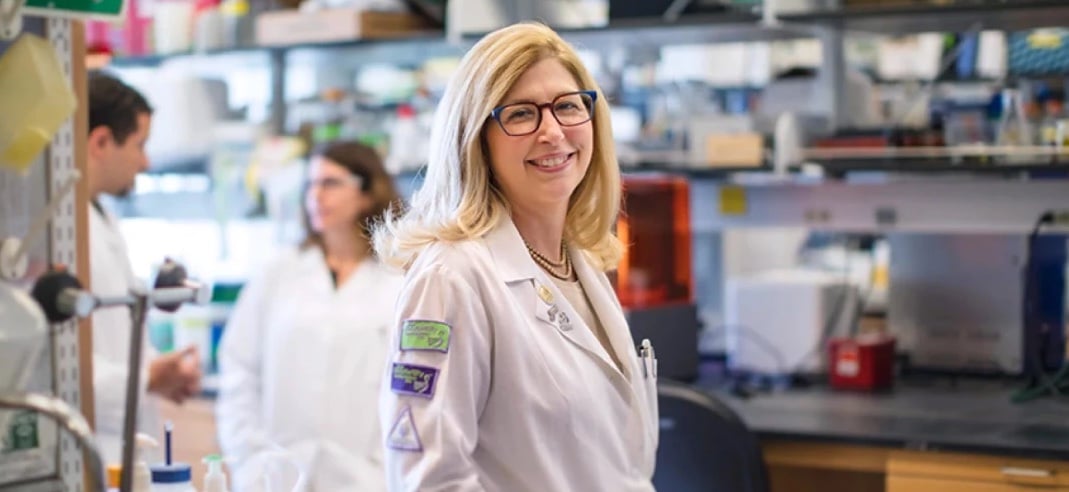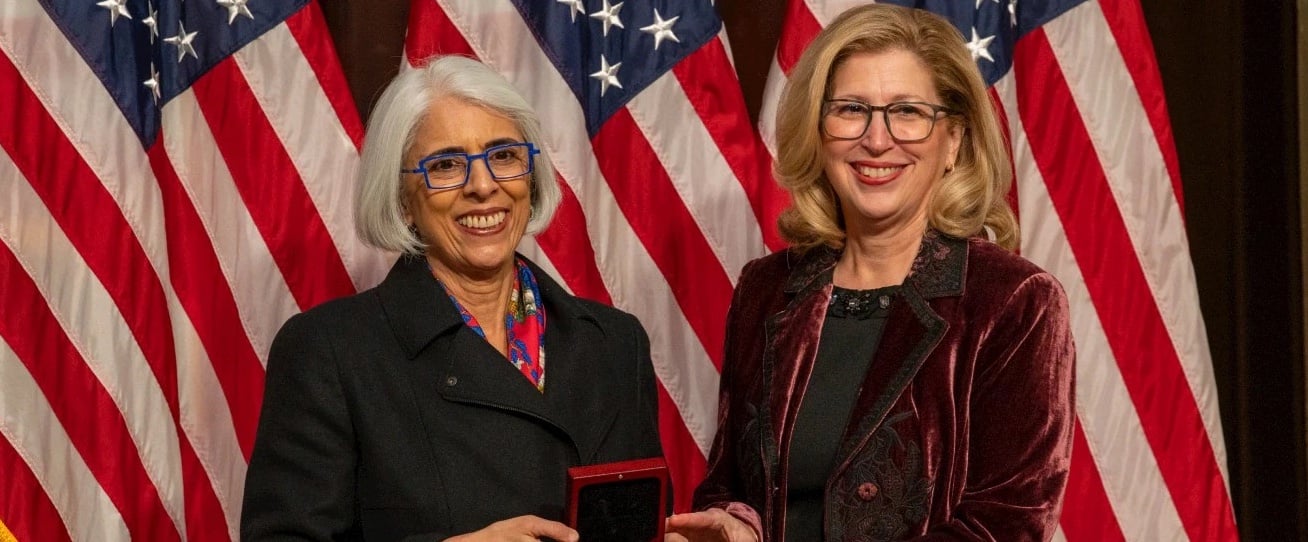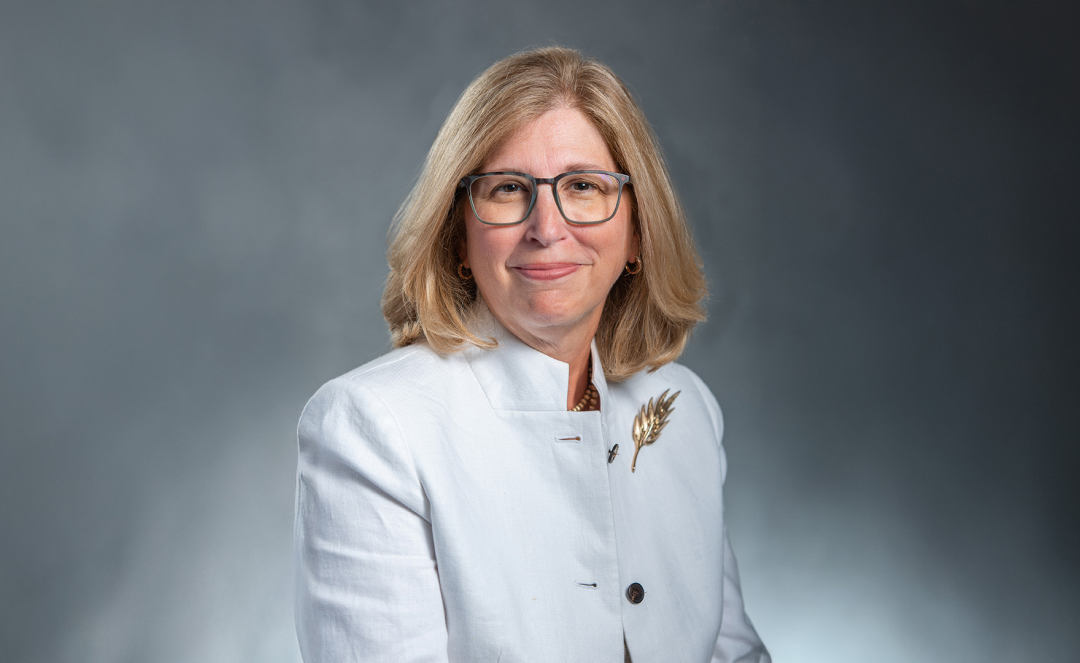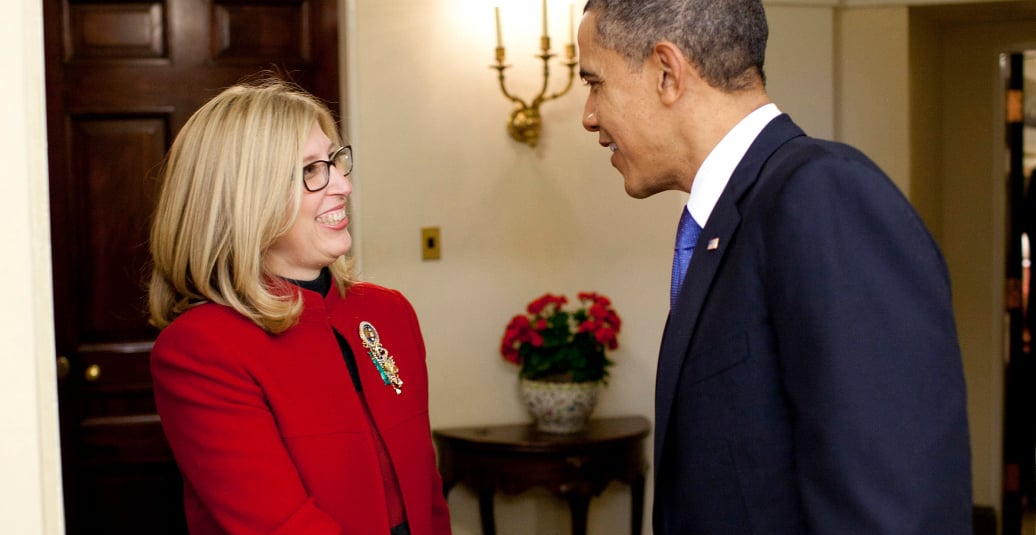Teresa K. Woodruff joined an elite group of Americans who have received two national medals of honor when President Joe Biden announced the latest recipients of the National Medal of Science on Jan. 3.
Arati Prabhakar, director of the White House Office of Science and Technology Policy, presented Woodruff with the medal at a ceremony at the Eisenhower Executive Office Building in Washington, D.C., on the same date.
Established in 1959 by the U.S. Congress and administered for the White House by the National Science Foundation, the National Medal of Science is the highest recognition the nation can bestow on scientists and engineers. A statement from the White House said that “those who earn these awards embody the promise of America by pushing the boundaries of what is possible. These trailblazers have harnessed the power of science and technology to tackle challenging problems and deliver innovative solutions for Americans and for communities around the world.”
The first person from Michigan State University to receive the National Medal of Science, Woodruff has made significant global contributions in scientific research, improvements to the scientific process and broadening of research teams. Woodruff, who also received a Presidential Award for Excellence in Science, Mathematics and Engineering Mentoring in 2011, is an MSU Research Foundation Professor in the Department of Obstetrics, Gynecology and Reproductive Biology at MSU College of Human Medicine and the Department of Biomedical Engineering at MSU’s College of Engineering. She was named provost of MSU in August 2020 and served as the university’s interim president from 2022-2024.
Woodruff’s scientific work is focused on the female reproductive system. She has made breakthroughs in molecular science, reproductive medicine and cancer research. Three independent discoveries from her lab have been cited as “Discoveries of the Year” by Discover magazine and one by the Chinese Academy of Medicine. She has more than 30 years of experience in leadership roles, including interim president at Michigan State University.
“Teresa Woodruff is an outstanding scientist, leader and humanitarian,” said MSU President Kevin Guskiewicz. “Her oncofertility research has given thousands of patients and their families hope for a better future. Along the way, she has mentored hundreds of students at every level and at every opportunity. And of course, Spartans around the world appreciated her service as interim president of MSU. I have been honored to follow in her footsteps.”
Woodruff created an entirely new field of science — oncofertility — that combines oncology and reproductive health. And she has rallied to include more women in the scientific process, leading to awards for mentorship. She is now one of the world’s leading fertility experts.
“I’m humbled to receive this award,” Woodruff said. “I have had the honor and pleasure to work with so many students and collaborators throughout my career. My fundamental belief is science should help tomorrow’s patients be treated better than today’s. This means we need to take our discoveries and turn them toward patient needs. And that includes broadening the pipeline of researchers in the field, advancing our discoveries from the bench to the bedside, and expanding the corridors of communication between physician groups and others who are in health care.”
Curiosity, intuition led to new science
Woodruff started her lab in 1995 at Northwestern University where she completed graduate studies. In 2002, she was named associate director for basic research of the Robert H. Lurie Comprehensive Cancer Center. One patient stands out in her mind, an adolescent boy with cancer who was brought in by his mother because she wanted to bank his sperm.
“That was really interesting because no one was talking about how to support cancer patients’ fertility,” Woodruff said. “I wondered what we were doing for young women who had cancer and was told that it was more important for the girls and young women to focus on their cancer care. That was a light bulb moment for me. I thought that all young cancer patients should have a future of fertility because we treat them with hope for their survival.”
Woodruff went on to apply her discoveries in reproductive science to the newly termed field of “oncofertility.” This work has helped thousands of people around the world maintain and protect their fertility. She also established the Oncofertility Consortium, an international interdisciplinary initiative of roughly 1,400 members that supports the reproductive future of young cancer survivors.
“I can’t get away from the reproductive problems and fundamental questions that remain,” Woodruff said. “Reproductive science is an understudied field, so you must be somewhat fearless and willing to take bold steps to make a difference in people’s lives.”
Additional discoveries by Woodruff and her collaborator, MSU Research Foundation Professor Thomas O’Halloran, include the “zinc spark,” which is a key indicator of successful human egg fertilization and possible embryo quality. This research enabled a new understanding of the earliest stages of human development and could lead to improved techniques for in vitro fertilization. It was named No. 47 in the Top 100 Discoveries of 2016 by Discover magazine.



